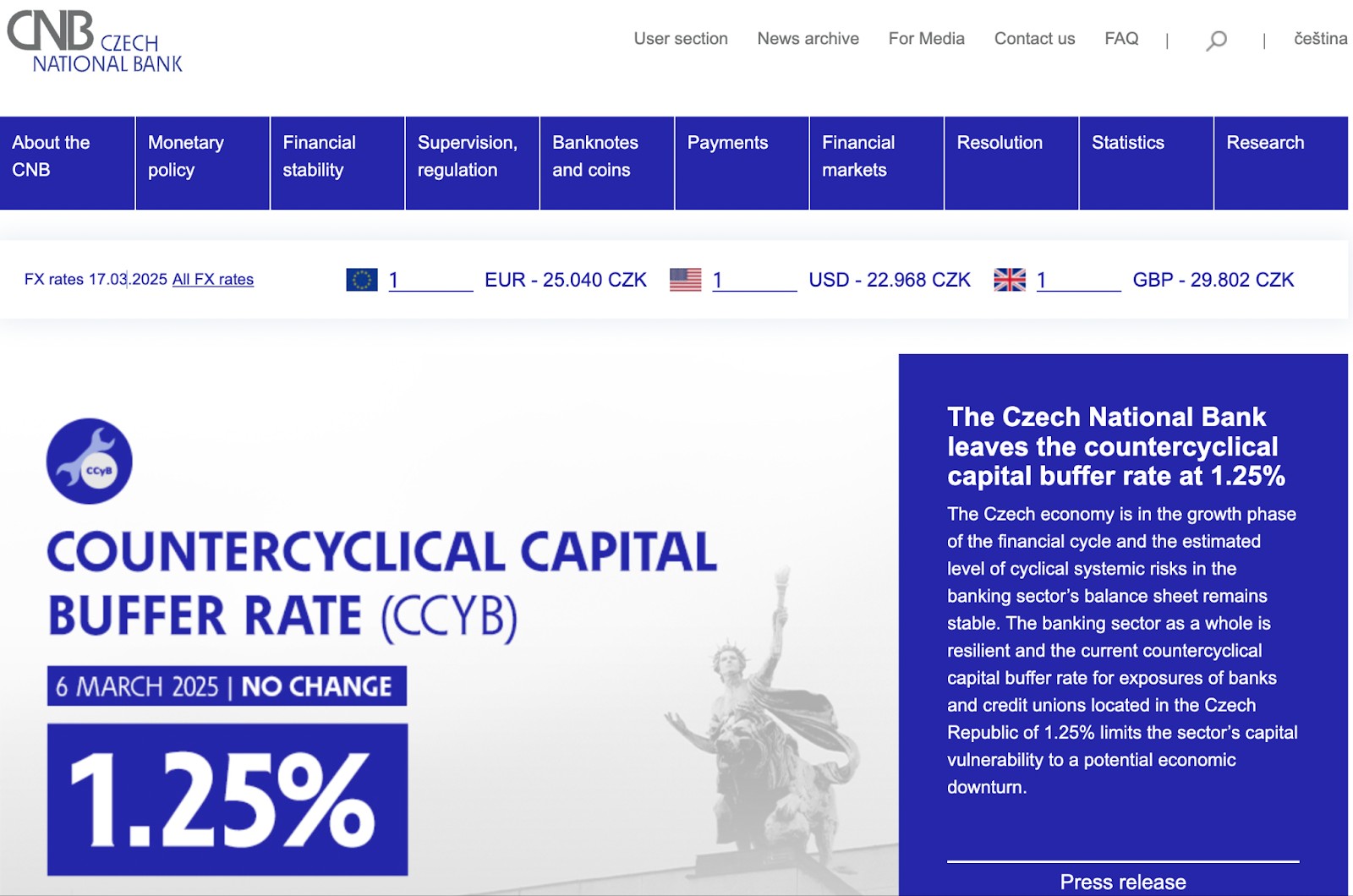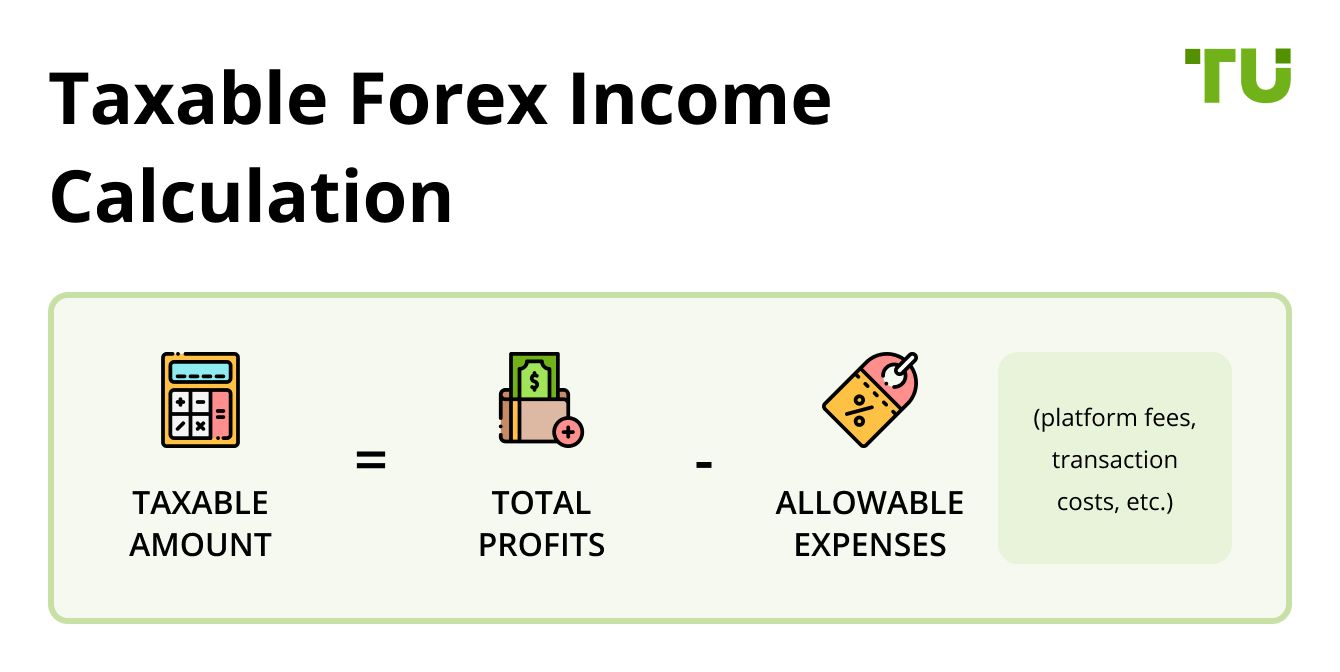Forex Regulation In Czech Republic And Taxes



Editorial Note: While we adhere to strict Editorial Integrity, this post may contain references to products from our partners. Here's an explanation for How We Make Money. None of the data and information on this webpage constitutes investment advice according to our Disclaimer.
The Forex market in the Czech Republic is regulated by the Czech National Bank (ČNB), which is responsible for licensing brokers and supervising their activities. Companies providing foreign exchange trading services must meet established requirements, including financial transparency and customer protection. In the Czech Republic, Forex trading income is subject to a progressive tax: 15% on income up to CZK 1,676,052 and 23% on earnings exceeding this threshold.
We have covered the main aspects of Forex regulation in the Czech Republic, including requirements for brokers, investor protection measures, and tax obligations, to help traders and companies navigate the country’s legal environment.
Risk warning: Forex trading carries high risks, with potential losses including your entire deposit. Market fluctuations, economic instability, and geopolitical factors impact outcomes. Studies show that 70-80% of traders lose money. Consult a financial advisor before trading.
How is Forex regulated in the Czech Republic
In the Czech Republic, the Forex market operates under the strict oversight of the Czech National Bank (CNB), which serves as the central authority responsible for supervising financial institutions and ensuring adherence to regulatory standards. The CNB's regulatory framework aligns with European Union directives, notably the Markets in Financial Instruments Directive II (MiFID II), to maintain market integrity and protect investors.

Legal framework for Forex regulation
The primary legislation governing Forex activities in the Czech Republic is the Act on Business Activities in the Capital Market (Act No. 256/2004 Sb.), which outlines the licensing procedures, operational requirements for investment firms, and measures for investor protection. This act is complemented by MiFID II, which introduces additional obligations related to transaction transparency, risk management, and the prevention of financial market abuses.
Requirements for Forex brokers and service providers
To operate legally, Forex brokers must obtain a license from the CNB. The licensing process mandates that applicants be registered as either a limited liability company (s.r.o.) or a joint-stock company (a.s.) within the Czech Republic. Capital requirements vary based on the scope of services offered:
Limited scope services: a minimum capital of €125,000 is required for brokerage firms offering a limited range of investment services.
Full range services: companies providing a comprehensive suite of investment services must maintain at least €730,000 in capital. Additionally, firms must ensure that their financial resources are legally obtained and that their management teams consist of at least two experienced professionals with verified track records in the financial sector. A detailed business plan outlining the company's operational strategy, risk management measures, and financial projections is also required as part of the application.
Regulatory oversight and compliance
Once licensed, Forex brokers are subject to continuous monitoring by the CNB to ensure compliance with regulatory obligations. The CNB conducts regular audits and requires mandatory reporting of transactions to maintain market integrity and protect investors. Non-compliance can result in penalties, including fines and the revocation of licenses.

Investor protection measures
The CNB's regulatory framework emphasizes investor protection through several key measures:
Transparency: brokers are required to provide clear and accurate information about their services, fees, and the inherent risks associated with Forex trading.
Risk management: firms must implement robust risk management systems to safeguard client assets and ensure financial stability.
Complaint resolution: a structured mechanism is in place for investors to lodge complaints against brokers, ensuring grievances are addressed promptly and fairly.
All Forex Regulators Reviews
The Czech National Bank (ČNB) and its role
The Czech National Bank (ČNB) serves as the central bank and financial market supervisory authority in the Czech Republic. Established on January 1, 1993, following the dissolution of Czechoslovakia, the ČNB is headquartered in Prague and operates under Act No. 6/1993 on the Czech National Bank and Act No. 21/1992 on Banks. Its primary objective is to maintain price stability and ensure the stability of the financial system.
The bank is responsible for setting monetary policy, issuing banknotes and coins, managing the circulation of the Czech koruna, and supervising various sectors, including banking, capital markets, insurance, pension funds, credit unions, and payment systems.
Licensing and requirements for brokers
In the Czech Republic, licenses for providing Forex services can only be obtained by companies registered in the country as a limited liability company (s.r.o.) or a joint-stock company (a.s.). Only such legal entities are eligible to apply for an initial brokerage license.
Main requirements for brokers include:
Minimum capital requirement: the required capital depends on the type of license. For an STP license, the minimum capital is €125,000, while for a market maker license, it is €730,000.
Transparency: companies must maintain a transparent ownership structure and verified capital sources. This ensures trust from regulators and clients.
Financial reporting: brokers are required to follow strict financial reporting standards, complying with both national and EU regulations. They must submit regular reports to the Czech National Bank (ČNB).
Client protection: companies must ensure client fund segregation, implement dispute resolution mechanisms, and adhere to client protection measures.
Differences between licensed and offshore brokers
Licensed brokers in the Czech Republic operate under strict regulatory requirements, ensuring high levels of transparency, client protection, and financial accountability. They are subject to regular oversight by ČNB, which increases trust among traders.
By contrast, offshore brokers often operate under less stringent regulations in jurisdictions with lower compliance standards. This can lead to reduced transparency, lack of mandatory reporting, and weaker client protection measures. While offshore brokers may offer more flexible conditions and lower costs, dealing with them carries higher risks for traders.
Protection of traders and investors
In the Czech Republic, trader and investor protection in the Forex market is ensured through strict security measures, broker transparency, and stringent regulatory oversight.
Client fund security measures
Licensed brokers are required to implement comprehensive measures to protect client funds, including:
Fund segregation: client funds must be held in separate bank accounts, distinct from the broker's operational funds. This prevents the misuse of client capital and ensures its safety even if the broker faces financial difficulties.
Data encryption: modern encryption technologies, such as SSL, are used to safeguard clients' personal and financial information from unauthorized access.
Two-Factor Authentication (2FA): implementing 2FA for account logins enhances security and reduces the risk of unauthorized access to client accounts.
How to verify if a broker is licensed?
To confirm a Forex broker's legitimacy and reliability, follow these steps:
License verification. Visit the broker’s official website and check for licensing details. Licensed brokers typically disclose their registration number and the issuing authority.
Regulator database check. Visit the Czech National Bank (ČNB) website and verify whether the broker is listed in the registry of licensed companies.
Review independent feedback. Research trader reviews on independent platforms to assess the broker’s reputation and past client experiences.
Taxation of Forex income in the Czech Republic

In the Czech Republic, income derived from Forex trading is subject to personal income tax, which operates on a progressive scale. As of 2025, the tax rates are structured as follows.
15% tax rate. Applied to gross annual income up to CZK 1,676,052.
23% tax rate. Applied to the portion of gross annual income exceeding CZK 1,676,052.
These rates encompass all income types, including profits from Forex trading, unless the income has already been taxed at source through withholding tax, such as certain dividends or interest.
Determining taxable income from Forex trading
For individual traders, Forex trading profits are typically classified under "other income." The taxable amount is calculated by subtracting any allowable expenses incurred to generate this income from the total profits. Allowable expenses may include costs directly associated with trading activities, such as platform fees or transaction costs. It is important to note that losses from Forex trading can only be offset against gains from similar income categories and cannot be carried forward to subsequent tax years.
Tax obligations for residents and non-residents
Residents. Individuals with a permanent residence in the Czech Republic or those who spend at least 183 days in a calendar year within the country are considered tax residents. They are obligated to report and pay taxes on their worldwide income, including Forex trading profits.
Non-residents. Non-resident individuals are taxed solely on income sourced within the Czech Republic.
Taxpayers must file an annual tax return detailing all income sources, including Forex trading profits. The deadline for submission is typically March 31 of the following year. However, this deadline can be extended if the tax return is prepared and submitted by a registered tax advisor under a power of attorney.
Recent developments
As of 2024, there have been proposed changes to the taxation system.
Lower threshold for higher tax band. The threshold for the 23% tax rate is proposed to decrease from four times to three times the annual average wage. This change means that individuals will enter the higher tax bracket at a lower income level than previously.
Introduction of sickness insurance contribution. A new sickness insurance contribution of 0.6% is proposed to be paid by employees, increasing their social security contributions from 6.5% to 7.1%.
Changes for self-employed individuals. The calculation base for social security contributions for self-employed persons is proposed to increase from 50% to 55% of their income tax base, effectively raising their contributions by 10%.
| Eightcap | XM Group | Bybit | RoboForex | VT Markets | |
|---|---|---|---|---|---|
|
Max. Regulation Level |
Tier-1 | Tier-1 | No | Tier-3 | Tier-1 |
|
CySec |
Yes | Yes | No | No | No |
|
Min. deposit, $ |
100 | 5 | No | 10 | 100 |
|
Max. leverage |
1:500 | 1:1000 | 1:500 | 1:2000 | 1:500 |
|
Fixed Spread EUR/USD, pips |
No | No | No | No | No |
|
ECN Commission |
3,5 | 3,5 | 3 | 2 | 3 |
|
Raw Commission |
3,5 | No | No | No | 3 |
|
Other CFD fees |
$2 per lot for stocks | Stock CFDs a comm of 0.1% of trade value | No | No | No |
|
Withdrawal fee, % |
No | No | No | 0-4 | 1-3 |
|
Open an account |
Open an account Your capital is at risk. |
Open an account Your capital is at risk. |
Open an account Your capital is at risk. |
Open an account Your capital is at risk. |
Open an account Your capital is at risk. |
Why trust us
We at Traders Union have analyzed financial markets for over 14 years, evaluating brokers based on 250+ transparent criteria, including security, regulation, and trading conditions. Our expert team of over 50 professionals regularly updates a Watch List of 500+ brokers to provide users with data-driven insights. While our research is based on objective data, we encourage users to perform independent due diligence and consult official regulatory sources before making any financial decisions.
Learn more about our methodology and editorial policies.
It is worth clarifying whether the broker is officially registered
In practice, many traders and companies face difficulties in complying with local regulations. Before starting trading, it is worth clarifying whether the broker is officially registered in the Czech Republic and whether it maintains reporting in accordance with European standards. You can check the status in the ČNB register, which lists all companies with permission to provide investment services. But even if a broker has a license, it does not mean that it fully complies with ČNB requirements.
Some traders do not record profits from trading, which can lead to fines during an audit by the tax service. The best option is to keep track of each transaction, record income and, if necessary, consult with tax specialists. The Czech Republic has strict rules for monitoring international transfers, so any large amounts in bank accounts can attract the attention of regulatory authorities.
When choosing a broker, you should also pay attention to the conditions for storing client funds. Licensed companies are required to keep client funds separate from their assets, but not all brokers comply with this principle. Before opening an account, it is worth requesting information about the custodian bank used to store funds. This will help avoid situations where the client's capital is at risk in the event of problems with the broker.
Conclusion
The Czech National Bank (ČNB) regulates the Forex market in the Czech Republic, overseeing broker licensing, compliance with regulatory requirements, and investor protection. Legal brokers must meet capital, transparency, reporting, and client funds protection requirements. We recommend that traders check the broker’s license on the ČNB website, analyze its reputation, and avoid working with offshore companies.
Compliance with local legislation not only guarantees the safety of investments, but also reduces the risk of financial losses. Choosing a licensed broker and proper tax reporting ensure stable and legal Forex trading in the Czech Republic.
FAQs
Can foreign traders trade Forex in the Czech Republic?
Yes, foreign traders can trade on Czech platforms if the broker accepts clients from their country. However, they must comply with the tax requirements of their jurisdiction and be aware of possible restrictions on the transfer of funds.
How are cryptocurrency pairs regulated in the Czech Forex market?
Cryptocurrency trading through licensed brokers falls under capital market regulation, but crypto assets themselves are not considered official financial instruments. Therefore, separate rules may apply to trading cryptocurrency pairs, including AML (anti-money laundering) requirements.
What penalties may a trader be liable for violating tax laws?
Failure to file a tax return on time or to pay taxes may result in penalties and fines, the amount of which depends on the amount of the debt and the period of delay. In case of serious violations, additional sanctions may be imposed, including tax audits and legal proceedings.
How to distinguish a financial pyramid from a legal broker?
Financial pyramids promise guaranteed high profits, require investments without real trading and often use aggressive marketing. A legal broker has a license, clear terms of cooperation and complies with the regulator's requirements, including the protection of client funds and reporting.
Related Articles
Team that worked on the article
Maxim Nechiporenko has been a contributor to Traders Union since 2023. He started his professional career in the media in 2006. He has expertise in finance and investment, and his field of interest covers all aspects of geoeconomics. Maxim provides up-to-date information on trading, cryptocurrencies and other financial instruments. He regularly updates his knowledge to keep abreast of the latest innovations and trends in the market.
Chinmay Soni is a financial analyst with more than 5 years of experience in working with stocks, Forex, derivatives, and other assets. As a founder of a boutique research firm and an active researcher, he covers various industries and fields, providing insights backed by statistical data. He is also an educator in the field of finance and technology.
As an author for Traders Union, he contributes his deep analytical insights on various topics, taking into account various aspects.
Mirjan Hipolito is a journalist and news editor at Traders Union. She is an expert crypto writer with five years of experience in the financial markets. Her specialties are daily market news, price predictions, and Initial Coin Offerings (ICO).
















































































































































